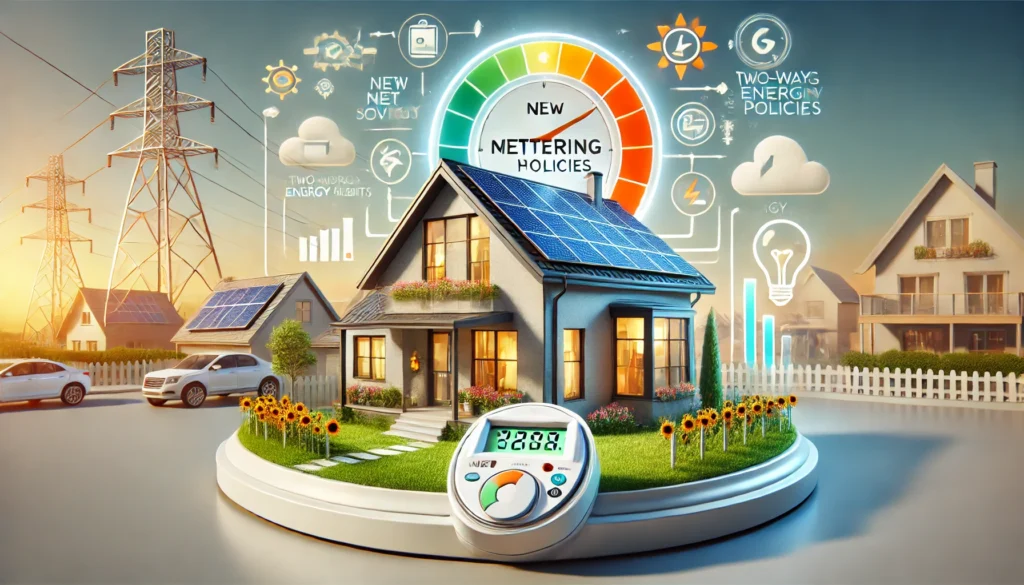How New Net Metering Policies Are Shaping Residential Solar: What Homeowners Nationwide Can Learn
The solar energy landscape in the U.S. is evolving—and one of the most talked-about topics today is net metering. As states like California update their policies and other regions consider changes, homeowners everywhere are wondering how these shifts might affect their solar decisions.
The good news? Residential solar is still a smart, cost-saving investment, even as net metering policies evolve. In this post, we’ll break down what net metering is, why it matters, and how homeowners across the country can still benefit from going solar in any policy environment.
What Is Net Metering?
Net metering is a billing arrangement that allows homeowners with solar panels to receive credit for the excess electricity they send back to the power grid.
Here’s how it works:
- Your solar panels produce electricity for your home.
- If they generate more than you use, that extra electricity is sent to the grid.
- Your utility company gives you a credit, which offsets your electricity costs when your solar panels aren’t producing—like at night.
Net metering helps homeowners maximize savings by ensuring they get full value for every kilowatt-hour their solar system produces.
What’s Changing with Net Metering Policies?
Several states are revising how net metering works—particularly how much credit homeowners receive for excess energy. These changes aim to balance solar growth with grid maintenance costs, but they can also impact the return on investment for residential solar systems.
Case Study: California (NEM 3.0)
California’s updated policy, Net Billing Tariff (NEM 3.0), took effect in April 2023 and:
- Reduced the value of exported solar energy.
- Encouraged homeowners to add battery storage so they can use more of their solar energy instead of sending it back to the grid.
- Aimed to shift solar generation to better align with peak energy demand times.
Other states—such as Florida, North Carolina, and Indiana—are exploring or implementing similar adjustments. While these policies may reduce the value of net metering credits, they’re also driving innovation and encouraging homeowners to maximize on-site solar usage.
What Homeowners Nationwide Can Learn
Even if your state hasn’t changed its net metering policy yet, there are valuable takeaways you can apply no matter where you live:
✅ Solar Is Still Worth It
While some policies are reducing the value of exported energy, homeowners still benefit greatly by:
- Using their own solar energy to avoid high utility rates.
- Offsetting daytime usage, especially with smart energy management tools.
- Installing battery storage to save energy for later use or emergencies.
✅ Batteries Make Solar More Valuable
In states with lower export rates, solar + storage becomes a powerful combination. A battery allows you to:
- Store excess energy generated during the day.
- Use it at night or during power outages.
- Avoid peak pricing by using stored energy when utility rates are highest.
Even in states with strong net metering, battery systems offer increased resilience and energy independence.
✅ Policy Changes Can Take Time
New net metering policies often take months—or even years—to roll out. If you go solar before the changes take effect, you may be grandfathered into existing policies, meaning you’ll lock in better rates for years to come.
✅ State and Federal Incentives Still Apply
Regardless of local net metering policies, homeowners can still take advantage of major incentives:
- 30% Federal Solar Tax Credit
- State and utility-level rebates
- Battery storage incentives in many regions
These programs significantly reduce the upfront cost of going solar and shorten the payback period.
Why Solar Still Makes Sense in 2025 and Beyond
Even with shifting policies, residential solar continues to offer:
- Lower monthly electricity bills
- Protection against rising utility rates
- Energy independence during grid disruptions
- Increased home value and long-term savings
Plus, as more homeowners adopt solar, the cost of equipment continues to drop, and solar panel technology gets more efficient—which helps maintain strong returns, even with reduced net metering rates.
Tips for Homeowners Considering Solar
💡 Do Your Homework: Learn about your local utility’s net metering rules and upcoming changes.
💡 Ask About Storage: Talk to your solar installer about battery options and how they can improve savings.
💡 Move Quickly: If a policy change is coming, install solar now to potentially lock in better rates.
💡 Work with a Reputable Installer: Choose a provider that stays on top of local regulations and can design a system that maximizes value under current and future rules.
Final Thoughts: Solar Is Still a Smart Move—With or Without Net Metering
Changes to net metering don’t eliminate the benefits of solar—they simply change the strategy. By understanding the evolving landscape and exploring options like battery storage, homeowners can continue to save money, reduce their carbon footprint, and increase their energy independence.
⚡ Thinking about going solar? Contact us today for a personalized consultation, and let’s build a system that makes sense for your home, your budget, and your state’s policies—today and for years to come.
Ready to make the switch?
Contact us today to learn how solar panels can help you save more in the long run!
Complete Residential Solar Panels and Systems. Serving Texas, Oklahoma, Kansas, Missouri, Utah, Florida & Ohio
Get a Free Quote Now
